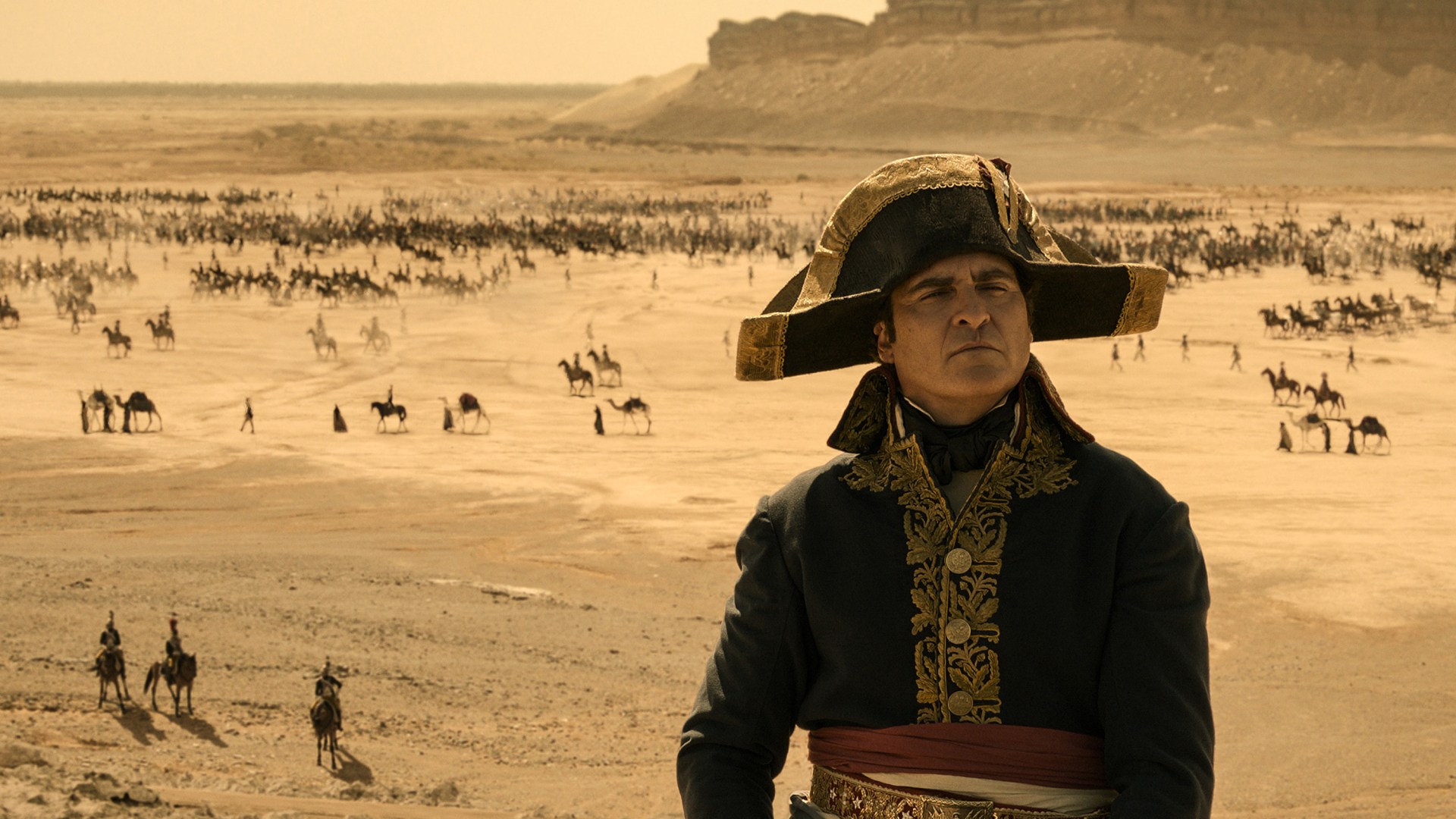After the violent throes of revolution, in a bankrupt French Republic on the brink of collapse, a man captured the hearts of his people and rose to rule. This is the story of Napoleon Bonaparte, the subject of director Ridley Scott’s new movie, Napoleon, in theaters for Thanksgiving.
Napoleon was one of the most fascinating people in history. Unfortunately, for all its big-budget set pieces and stars, Scott’s film is underdeveloped and confused—in its basic historical storytelling, but, more importantly, in what it has to say about its subject and the meaning of his life.
Napoleon begins with the bloody fall of the French monarchy and, with it, the head of its famous queen Marie Antoinette. From there, we meet Napoleon (Joaquin Phoenix), a lowborn but ambitious officer who seizes his chance to rise to power in the chaotic aftermath of the revolution. The movie follows the major beats of his life point by point, from his first military success at Toulon to his final exile on the island of Saint Helena.
Scott pushes through these phases in confusing succession. From Toulon, which is in France, Napoleon is suddenly in Egypt. If you’re a student of 18th- and 19th-century Europe and its constant power struggles, you know Napoleon campaigned through Egypt to weaken France’s rival Great Britain by nipping at their Middle Eastern holdings. But if you don’t already know this context, you simply see Napoleon with the Great Sphinx at Giza—and likely wonder what he’s doing there and why.
Also strangely handled is Napoleon’s conflicted love affair with Josephine, the woman he made Empress of the French, then later abandoned. Their story is the stuff of legend, one of history’s great enigmas: They remained deeply connected after their divorce, and her death devastated him. His name was reportedly among the last words she spoke in life.
But Napoleon’s script tells rather than shows much of this world-historic romance. As Josephine, Vanessa Kirby (formerly Princess Margaret in The Crown) is radiant as usual, but some of the dialogue between her character and Napoleon was so awkward it elicited laughs from the audience in my screening—and not the good kind.
Phoenix plays Napoleon as a cold, silent strongman, at times a brute. He’s an excellent actor in the right role, but this portrayal doesn’t get us any closer to understanding the phenomenon that was Napoleon. Why did his people love him so fervently? Why, for that matter, did Josephine? Napoleon’s Napoleon is wholly without appeal, leaving the film without a theory of his rise to power that viewers could consider applying to powerful figures of our own time.
That central lack is a shame because Napoleon has some strong elements. If a glorious cavalry charge—pennants streaming, hooves thundering, sabers flashing in the sun—is what you like in a historical epic, this movie is for you. Scott gives each war scene special attention, from the placement of artillery to the bitter cold of the Russian invasion. Battle nerds will be pleased. More military-focused excerpts of the film could be useful for high school students of European history.
It’s unclear what went wrong with Napoleon. A good director, a very capable cast, and an epic scale in production come together to make something less than the sum of their parts. Maybe recent strikes in Hollywood hampered the post-production editing, or maybe the participants just didn’t meld.
Whatever the reason, the film has moments that could have been profound. Napoleon’s encounter with the monuments of long-dead, ancient pharaohs could have been a meditation on the fleeting lives of even the most successful of ambitious men. Instead, the moment passes without that depth.
The movie also leaves out any mention of faith. Without prior knowledge, a viewer could almost finish the film never knowing there were priests and churches in the land of Notre Dame. The French Revolution shook the church as much as the monarchy, but in this telling, the church seems to have never existed. Scott does show Napoleon’s grand rebellion of placing the crown on his own head rather than submitting to the church’s placement of the crown, but the movie does not show why that mattered.
Napoleon could speak to us today. He arose in a time of populism, unrest, revolution. He captured a country’s imagination, both feeding and feeding on its self-narrative of greatness. Ultimately, he failed his people—and blamed them for that failure.
Fill in a few context clues from Wikipedia, and Napoleon can provide a serviceable history lesson. But it could have been epic in more than its battles; it could have been an epic tale of a man who almost gained the whole world.
Caveat Spectator
Napoleon has several sex scenes, though they are brief. There are a few moments of gore, as would be expected in a movie about pre-modern European wars. The violence is generally muted, but it adds up to enough for an R rating.
Rebecca Cusey is a lawyer and movie critic in Washington, DC.










